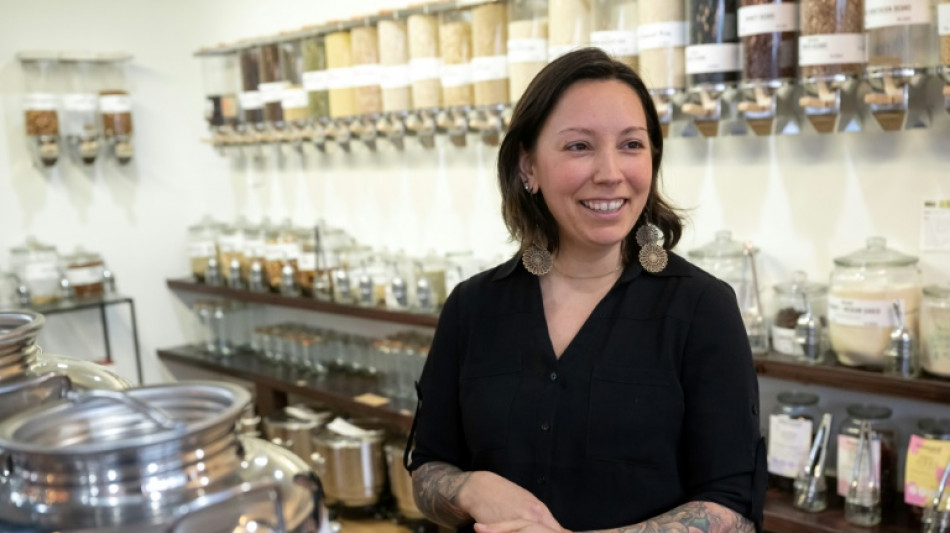
-
 Tech firms lead markets higher, oil swings after Maduro ouster
Tech firms lead markets higher, oil swings after Maduro ouster
-
Defending Brisbane champion Lehecka wins tough opener

-
 Maduro's fall tests Venezuela's ruling 'club'
Maduro's fall tests Venezuela's ruling 'club'
-
'I can't walk anymore': Afghans freeze to death on route to Iran

-
 UK starts ban on junk food ads on daytime TV and online
UK starts ban on junk food ads on daytime TV and online
-
Trump declares US 'in charge' of Venezuela and Maduro goes to court

-
 Two killed in series of Russian attacks on Ukraine
Two killed in series of Russian attacks on Ukraine
-
Kasatkina feels pressure to 'repay Australia' after Russia switch

-
 Suns stun NBA-best Thunder as East-leading Pistons top Cavs
Suns stun NBA-best Thunder as East-leading Pistons top Cavs
-
China's birth-rate push sputters as couples stay child-free

-
 'Not about condoms': Chinese shrug off contraceptive tax
'Not about condoms': Chinese shrug off contraceptive tax
-
Root's majestic 160 powers England to 384 in final Ashes Test

-
 Chalamet boosts Oscar bid with Critics Choice Awards win
Chalamet boosts Oscar bid with Critics Choice Awards win
-
'Tuna King' pays record $3.2 mn for bluefin at Tokyo auction

-
 Tech firms lead Asian markets higher, oil swings after Maduro ouster
Tech firms lead Asian markets higher, oil swings after Maduro ouster
-
Cricket Australia boss hits out at 'archaic' bad light rules

-
 Trump insists 'we need Greenland'
Trump insists 'we need Greenland'
-
Century-maker Root steers England to 336-6 in final Ashes Test

-
 'Free our president', Maduro supporters demand at rally
'Free our president', Maduro supporters demand at rally
-
Danish PM calls on US to stop 'threatening' Greenland

-
 North Korea tests hypersonic missiles, says nuclear forces ready for war
North Korea tests hypersonic missiles, says nuclear forces ready for war
-
Root in Ponting territory with 41st Test century at 5th Ashes Test

-
 Guan Huat Seng Holdings Berhad Launches IPO Prospectus To Drive Next Phase Of Growth
Guan Huat Seng Holdings Berhad Launches IPO Prospectus To Drive Next Phase Of Growth
-
Apex Receives Exploration Permit for Rift REE Project, Nebraska; Drill Program Preparation Underway

-
 South Korea's Lee to meet Xi with trade, Pyongyang on the agenda
South Korea's Lee to meet Xi with trade, Pyongyang on the agenda
-
Messi's Miami sign Canada goalkeeper St. Clair

-
 Pistons top Cavs as Pacers' NBA misery continues
Pistons top Cavs as Pacers' NBA misery continues
-
Gonzalo treble helps Real Madrid thrash Betis, Atletico hopes dented

-
 Djokovic quits players' union he co-founded
Djokovic quits players' union he co-founded
-
Anne Frank's step-sister, Holocaust survivor Eva Schloss dies

-
 France's Le Garrec inspires La Rochelle to Toulon rout
France's Le Garrec inspires La Rochelle to Toulon rout
-
Hosts Morocco reach AFCON quarter-finals as Cameroon knock out South Africa

-
 Inter Milan reclaim Serie A summit
Inter Milan reclaim Serie A summit
-
Atletico title hopes dented in Real Sociedad draw

-
 Doue, Dembele light up first Paris derby in over 35 years
Doue, Dembele light up first Paris derby in over 35 years
-
Swiss grieve as all fire victims identified -- half of them under 18

-
 Panthers advance to NFL playoffs after Falcons beat Saints
Panthers advance to NFL playoffs after Falcons beat Saints
-
Cameroon end South Africa hopes to reach AFCON last eight

-
 'A gift' to be back, says Rodri despite Man City stumble
'A gift' to be back, says Rodri despite Man City stumble
-
Colombian guerrillas vow to confront US 'imperialism'

-
 Morocco lose injured playmaker Ounahi for rest of AFCON bid
Morocco lose injured playmaker Ounahi for rest of AFCON bid
-
Trump threatens new Venezuela leader after raid to seize Maduro

-
 Man City title hopes hit by managerless Chelsea
Man City title hopes hit by managerless Chelsea
-
Man City held by Chelsea in major title blow, Liverpool denied in Fulham thriller

-
 Managerless Chelsea dent Man City title hopes
Managerless Chelsea dent Man City title hopes
-
Ekitike's absence in Fulham draw leaves Slot with threadbare options

-
 Delcy Rodriguez: From Maduro's 'tigress' to acting Venezuelan president
Delcy Rodriguez: From Maduro's 'tigress' to acting Venezuelan president
-
Frank defends Johnson sale after Spurs jeered in Sunderland draw

-
 France, UK conduct joint strikes against IS in Syria
France, UK conduct joint strikes against IS in Syria
-
Amorim tells Man Utd hierarchy to 'do their job'


Toothpaste tablets and syrup on tap: US refill shops cut the container
Toothpaste tabs plunk into a jar. Maple syrup flows viscously from a spout. Dishwasher powder crunches under the tip of a metal scoop. The chorus of consumer goods lacks one familiar sound: the crinkle of plastic wrap.
At Mason & Greens in Washington, the lack of packaging is the point -- the small shop selling household goods and groceries is among dozens of zero-waste refill stores sprouting up in US cities from Brooklyn to Los Angeles.
Customers bring their own containers -- from used jars to Tupperware, to fill with bulk items. The store even has "had people bring in the sleeves that their newspapers come in," owner Anna Marino, 34, told AFP.
Such stores are emblematic of what experts say is a necessary culture shift in one of the world's largest consumer economies, where the average person generates 4.9 pounds of waste per day, according to government statistics.
Marino says the aim is to help anyone from novices to experts on their journey towards less waste, citing paper towels as a personal catalyst.
"Quitting paper towels was one of the first things that my family did and it was a significant reduction in the waste that we were creating on a weekly basis," said Marino, who co-founded the store with her husband.
Reusable "paper" towels made of cloth are just one of the products she now sells at her store, where beans and oats fill wall-mounted dispensers, metal containers hold vinegar and olive oil, and shelves are stocked with package-free artisanal bread, veggies and vegan food.
For bulk items, customers pay by weight, Marino's aim being to avoid any "obnoxiously outrageous price" and to keep things "accessible."
Reusable containers, such as mason jars, can be purchased if needed.
Upstairs, shampoo bars and toothpaste tablets that are chewed until becoming paste are among the store's many unpackaged hygiene products.
Less than a third of US municipal solid waste was recovered for recycling or composting in 2018, according to the Environmental Protection Agency, and only about nine percent of plastic material was recycled.
Statistics such as these are why Marino asks suppliers to send shipments in compostable, or minimal packaging.
- 'Reduce, reuse' first -
"We can't recycle our way out of the plastics crisis," says Jenny Gitlitz of the advocacy group Beyond Plastics.
She points to toxins in plastic that can be carcinogenic or cause genetic mutations, as well as to endocrine disruptors.
On top of that, tiny particles called microplastics have been discovered in virtually every environment, from the Mariana Trench to Mount Everest, as well as in the human body including the lungs and blood.
Unlike aluminum and glass, plastic can only be recycled a few times before its polymers break down. And many types are not widely recyclable in the first place.
"If all else fails, then recycle," sums up professor Shelie Miller at the School for Environment and Sustainability at the University of Michigan.
"I think folks often skip straight to the recycle and forget to reduce, reuse," she told AFP.
Miller cautions that the issue of plastic waste will not be solved simply by individuals changing the way they consume -- as exemplified in places like Mason & Greens.
Creating a sustainable future "really is a complete shared responsibility model" involving corporations, governments and waste handlers, she said.
- 'No choice' -
In the meantime, though, Rini Saha -- the co-owner of the FullFillery, another Washington-area refill shop in the suburb of Takoma Park, Maryland -- hopes to make a difference from the ground up.
"We want you to reuse as much as we can, because recycling is still a huge carbon footprint," the 46-year-old told AFP.
Saha and colleagues make a number of body care and cleaning products on-site, for refill or purchase in a returnable container.
On a recent Wednesday morning, fellow co-owner Emoke Gaidosch, a chemist by training, poured liquid soap she had made into a large receptacle.
Aside from the lack of packaging, Miller says bulk sales could yield even bigger environmental benefits by helping consumers buy only what they need.
That, ultimately, can help eliminate the impacts from a product's entire lifecycle, from the energy and resources used to create it, to things like methane released when unused organic waste decays in landfalls.
Over three years of existence, the FullFillery has morphed from a farmer's market stall to a large store lined with environmentally friendly products and extremely limited packaging.
Similarly, Mason & Greens' Washington location, which only opened in September, was an expansion after the success of its first location in another suburb.
The model "is profitable," Saha told AFP. "I don't think it's as profitable as a disposable business."
"But I think that inevitably, there's no choice. This is the way that business has to go."
Th.Berger--AMWN



